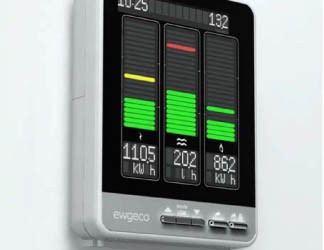UK households could significantly cut their energy bills by using a real-time energy monitor, a new study suggests.
A team from Edinburgh Napier University assessed the performance of 65 housing association homes, all of which were pre-fitted with a Ewgeco real-time energy monitor.
The results of the six month trial showed that those that used the Scottish firm’s award-winning device consumed up-to 20 per cent less gas than other households in the study.
“Our findings demonstrate that in-house utility displays can offer a tangible means of energy reduction by enabling behavioural change,” said study author John Currie, director of the Scottish Energy Centre at Edinburgh Napier University.
The Ewgeco monitor’s simple traffic light display of green, amber and red highlights real-time low, medium or high energy usage.
It works with ordinary utility meters to provide households with instantaneous information on their gas, energy and water consumption.
Forty-three of the homes in the trial, which was funded by the UK’s Technology Strategy Board, had the Ewgeco monitor clearly on display, while it was hidden in the remainder of the properties.
Researchers found that households that could see and use the energy-saving device consumed up to 20 per cent less gas, and seven per cent less electricity, compared to the properties with a hidden monitor.
In interviews, around 94 per cent of tenants also said that the Ewgeco device made them more aware of the energy they were using, while 73 per cent said it made them use less energy.
The study was the first of its kind in the UK involving a real-time energy monitor to track and monitor domestic gas and electricity consumption.
“What we found was that by allowing everyone in the home to see and quickly understand the electricity and gas being consumed, the Ewgeco monitor became a catalyst for increased awareness of wasted energy,” said Mr Currie.
He added: “With the introduction of smart metering technologies in all homes in the UK by 2020, it is imperative that such devices be linked with easy-to-understand interactive user-displays if national energy reduction targets are to be realised and not just seen as a means of providing utility suppliers with demand information.”
One study participant, a single mum with two children of primary school age, found it difficult to understand her bills and keep track of her spending until she discovered the Ewgeco’s daily target alarm app.
“When I get back from work and the kids arrive back from school everything gets turned on and sometimes left on unattended for hours,” she said. “The alarm means we can now budget our energy use to how much I can actually afford every day.”
The real-time energy monitor was devised by Perth entrepreneur, Tanya Ewing, who was named British Female Inventor of the Year in 2008.
The former housewife, who was inspired to come up with the invention after receiving a particularly high gas bill, said: “Having won multiple awards for what originally was a good idea, it is very rewarding to read this report and see the proof that Ewgeco does what it’s meant to do – save money and energy in an intuitive way without changing your lifestyle.”
Dunedin Canmore Housing Association, Perthshire Housing Association and Glen Housing participated in the study after installing Ewgeco monitors in their new developments.
“This study indicates that the Ewgeco monitors have been helping our tenants to become more aware of their energy usage which has helped them to save energy and reduce their utility bills: this is great news, especially in the current climate where utility costs are set to increase significantly next month,” said Susan Napier, Dunedin Canmore Housing Association’s business development director.
MEDIA RELEASE posted by Edinburgh Napier University. You too can post media releases (aka press releases) on allmediascotland.com. For more information, email here.
Contact: Patrick McFall
Phone: 0131 455 6314 / 07917 559 503
Email: p.mcfall@napier.ac.uk
Website: http://www.napier.ac.uk






